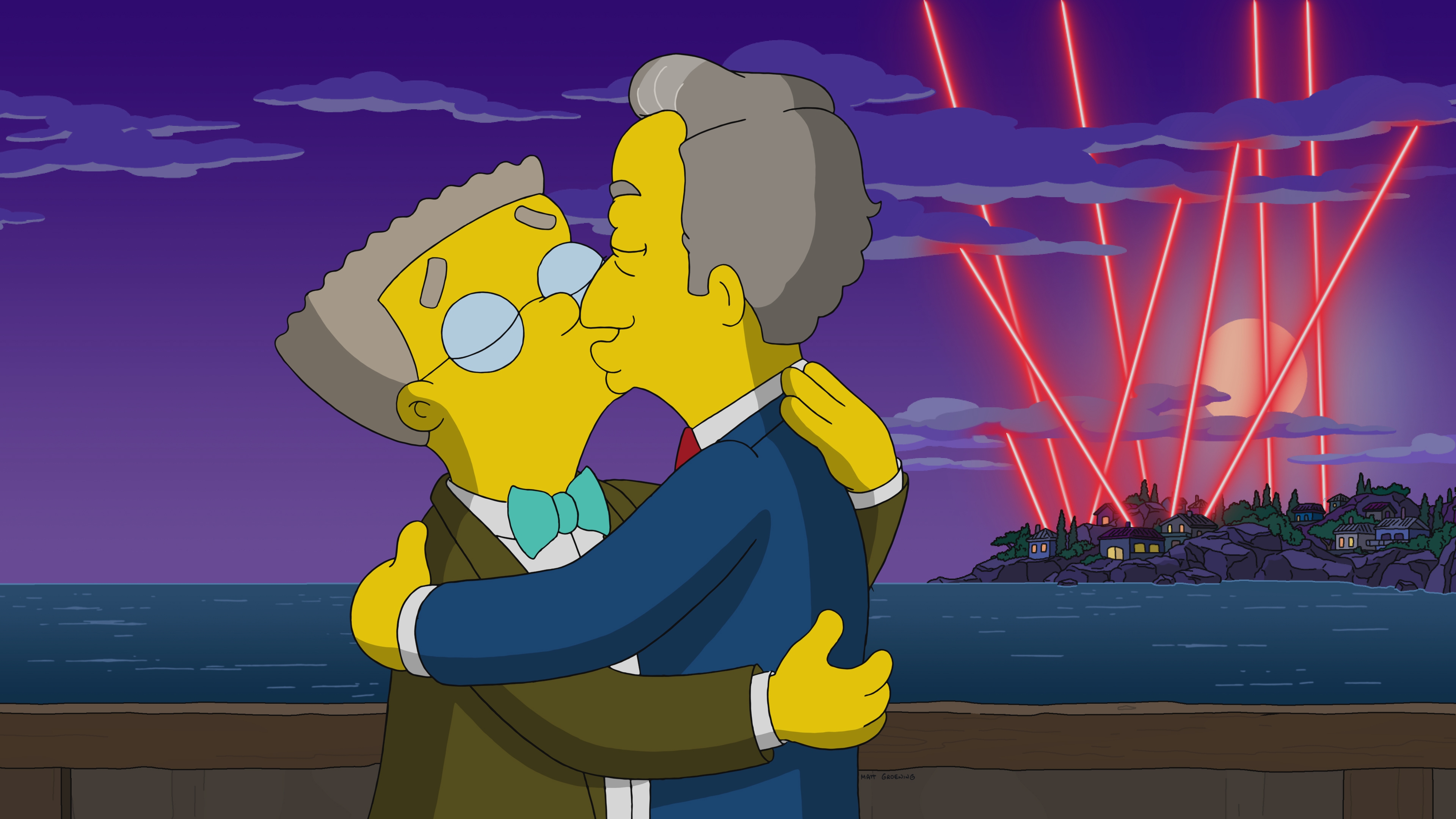Centered on the ticky-tacky marriage of Homer and Marge, The Simpsons is still perhaps one of the most hetero TV shows out there. It’s also pure and certain comfort at this point, which is why I have rewatched so much of it during the pandemic. For 33 seasons, the cartoon has been microwave popcorn and Mountain Dew. To that end, I don’t expect Springfield to destroy gender or feature any fully realized, dildo-wielding femmes, but I do expect the familiarity and warmth of an after-school snack.
That’s not to say The Simpsons is without its cruelties. When queerness does emerge on the show, it’s historically at the expense of Waylon Smithers (Harry Shearer), Mr. Burns’ long-abused personal assistant. Mr. Smithers’ attraction to Mr. Burns is a poorly kept secret throughout early seasons, with the writers exploiting his gay shame in the name of frat-boy humor. In season four’s “Marge Gets A Job,” Mr. Smithers has a romantic vision of Mr. Burns flying into his bedroom window at night. Here, queer desire is coded as grotesque and pathetic, a reflection of how broadcast TV generally painted LGBTQ+ lives at the time.
Thankfully, three decades of different writers and politics have changed Smithers’ place on the show. In more recent seasons, his sexuality has become an open part of the narrative. The series’ latest episode, “Portrait Of A Lackey On Fire,” accomplishes what it sets out to: For 15 minutes, Mr. Smithers has a boyfriend who treats him well without his sexuality being a punchline. The story is as safe as a Pride parade with the sweetness of an old-school drag show. Imagine a set of straight parents who are trying their best to support and bond with their gay child. That’s the vibe—we’re not gonna get a vibrator.
The first act of the episode begins at Mr. Burns’ mansion, where a new litter of “the hounds” have just been born: “Four boys, three girls, and, uh, one who would prefer not to be labeled yet.” Mr. Burns (also Shearer) tasks Smithers with their training, which involves using Homer (Dan Castellaneta) as an attack dummy. As the puppies chew up Homer, Smithers bemoans his unrequited love for his boss.
The B-plot takes off as Mr. Burns then discovers a jigsaw puzzle sent by Warren Buffett and tries to make heads or tails of it. His slow understanding of the puzzle he’s putting together reemerges throughout the episode to add a bit of on-brand, aloof humor. It’s expectedly charming.
Meanwhile, Homer discovers Smithers crying alone in a dog kennel, longing for companionship and love. Homer offers encouragement, and after reviewing the dating profiles on “U.S. Male Service” (which features a quick rundown of all the gay characters featured throughout the show), decides to play queer matchmaker for Smithers (“I’m gonna find you a man-Marge!”). The “ally” playing haphazard wingman is a well-worn device in the sitcom world: Sex And The City and The Office, among many others. It’s used as a way of assuring viewers that their main characters are straight but not narrow.
Mr. Burns pawns off the murderous puppies to other corrupt businessmen, shaming the one friendly dog left behind. A smooth fashion designer named Michael de Graaf (guest star Victor Garber) steps up to adopt the pet, casually identifying himself as gay and giving Homer the opportunity to set up Smithers. An opposites-attract connection comes out as the two men click and embark on a passionate, open love affair.
This nearly seamless visibility implies that Springfield embraces Smithers’ sexuality and wants to see him happy. It also gives the writers a chance to further flesh out the supporting cast while making good on the series’ earlier mistreatment of queer characters, including Smithers. In fact, the real clown here is Luigi’s homophobic mother, who gets her own queer arc. “Lackey” has been billed erroneously as the first time Smithers has had a real relationship, but it’s actually his second; he got together with Julio (originally voiced by Hank Azaria, now voiced by Tony Rodriguez) in season 27’s “The Burns Cage.”
However, much of the episode’s sweetness comes from behind the scenes. Written by the father-and-son duo of Rob and Johnny LaZebnik, the episode served as a bonding experience as Rob brought in Johnny, an openly gay man, to add his lived perspective to the production’s themes. The younger LaZebnik, who never formally came out to his parents but received boatloads of unwavering support from his family, grew up with his father writing for the show and intuitively understands how it can evolve without patronizing its audience. The result is still very much The Simpsons, but it’s a punch across instead of a punch down—the writers now know how to make fun of Mr. Smithers without dehumanizing him. We get big PFLAG energy without the franchise losing its salt.
That’s quite an accomplishment. Does it imperfectly operate on stereotypes? Sure, and it’s clear that showrunner Al Jean and his team are trying to figure out how to balance that part of The Simpsons’ flavor with their own progressive political values. “Portrait Of A Lackey On Fire” is ultimately a winning story because it treats Smithers with the same special blend of ridicule and tenderness it bestows upon the straight characters.









































